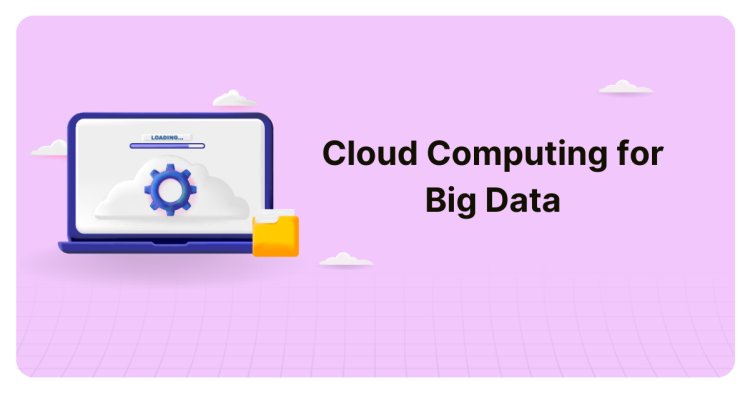Role of Cloud Computing in Big Data Analytics
Explore the integration of cloud technologies to unlock insights from vast datasets, streamline operations, and drive informed decision-making in today’s data-driven landscape.
Share this Post to earn Money ( Upto ₹100 per 1000 Views )

Introduction
Big data analytics involves examining large and complex data sets to uncover patterns, trends, and insights that inform decision-making. As data continues to grow exponentially, organisations are actively seeking efficient methods to store, process, and analyse this information. Cloud computing has emerged as a powerful solution, offering flexibility, scalability, and cost-effectiveness. This article explores the role of cloud computing in big data analytics, highlighting its benefits, challenges, and real-world applications.
Understanding the Synergy Between Cloud and Big Data
-
Scalability: Cloud computing offers on-demand scalability, allowing organisations to rapidly adjust their computing resources to meet fluctuating data processing needs. This is crucial for Big Data analytics, where workload can vary significantly based on factors like seasonal fluctuations, marketing campaigns, or unexpected events.
-
Cost-Efficiency: Traditional data centres can be expensive to set up and maintain. Cloud computing provides a pay-as-you-go model, eliminating the need for upfront capital investments. This makes it a more cost-effective option for organisations, especially those with limited budgets or fluctuating data processing requirements.
-
Flexibility: Cloud platforms offer a wide range of services, including storage, computing power, and analytics tools. This flexibility allows organisations to choose the best combination of resources to meet their specific Big Data needs.
-
Reliability: Cloud providers invest heavily in infrastructure redundancy and disaster recovery to ensure high availability and data security. This is essential for Big Data analytics, where data loss can have significant consequences.
Key Cloud Services for Big Data Analytics
-
Data Lakes: Cloud-based data lakes provide a centralized repository for storing large volumes of structured and unstructured data in its raw format. This eliminates the need for complex data warehousing solutions and enables organizations to perform exploratory data analysis and machine learning tasks.
-
Hadoop and Spark: These open-source frameworks are widely used for processing and analyzing Big Data. Cloud providers offer managed Hadoop and Spark services, simplifying deployment and management for organizations.
-
Data Warehousing: Cloud-based data warehouses provide a structured environment for storing and analyzing large datasets. They offer features like data integration, data quality management, and reporting capabilities.
-
Machine Learning: Cloud platforms offer a variety of machine learning services, including pre-trained models, algorithm libraries, and tools for building custom models. These services can be used to extract valuable insights from Big Data and make data-driven decisions.
Real-World Applications of Cloud Computing in Big Data Analytics
-
Healthcare: Cloud computing is being used to analyze electronic health records (EHRs) to identify disease patterns, improve patient outcomes, and develop personalized treatment plans.
-
Financial Services: Banks and insurance companies are using Big Data analytics to detect fraud, assess risk, and develop new products.
-
Retail: Retailers are analyzing customer data to personalize marketing campaigns, optimize inventory management, and improve customer satisfaction.
-
Manufacturing: Manufacturers are using Big Data analytics to optimize production processes, reduce waste, and improve product quality.
-
Government: Governments are using Big Data analytics to improve public services, enhance national security, and make informed policy decisions.
Challenges and Considerations
While cloud computing offers numerous benefits for Big Data analytics, there are also some challenges to consider:
-
Data Security: Organisations must implement robust security measures to protect sensitive data stored in the cloud.
-
Vendor Lock-in: Relying heavily on cloud providers can create vendor lock-in, making it difficult to switch to other platforms.
-
Network Latency: High network latency can impact the performance of Big Data analytics applications, especially when dealing with large datasets.
-
Governance and Compliance: Organisations must ensure that their cloud-based Big Data analytics practices comply with relevant regulations and industry standards.
The Future of Cloud Computing and Big Data Analytics
As technology continues to evolve, the relationship between cloud computing and Big Data analytics is likely to become even more intertwined. Here are some trends to watch:
-
Edge Computing: Edge computing involves processing data closer to its source, reducing latency and improving real-time analytics. This will be particularly important for applications that require immediate insights, such as IoT devices and autonomous vehicles.
-
Serverless Computing: Serverless computing eliminates the need for organizations to manage servers, allowing them to focus on building applications. This can make it easier and more cost-effective to deploy Big Data analytics workloads in the cloud.
-
AI and Machine Learning: AI and machine learning are becoming increasingly important for extracting value from Big Data. Cloud providers are offering a wide range of AI and machine learning services to help organizations build and deploy intelligent applications.
-
Quantum Computing: Quantum computing has the potential to revolutionize data processing and analysis. While still in its early stages, quantum computing could be used to solve complex problems that are intractable with classical computers.
In conclusion, Cloud computing has become an essential tool for organizations managing big data. By leveraging the scalability, cost-efficiency, flexibility, and reliability of cloud platforms, organizations can unlock the value of their data and gain a competitive edge in today's data-driven landscape. For individuals seeking to enhance their expertise, a data analytics training institute in Noida, Delhi, Pune and other Indian cities offers valuable education and practical skills to navigate this dynamic field.














